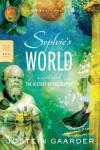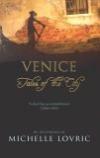Due Settimana in Italia
An Apolitical Travelogue
by Eric S. Piotrowski
Interlude #3: The Books I Read
I always read a lot when on vacation. Having lots of time away from my digital addictions is good for my literary mind. These reviews (displayed in the order I read the books) are taken from my GoodReads page. Additional comments and links have been added where appropriate.
Sophie's World: A Novel about the History of Philosophy
by Jostein Gaarder





The subtitle of this book should be: A novel about the history of Western philosophy. They've got some nerve putting Buddha on the cover! (He's mentioned twice, in passing.) Still, an interesting idea and done well for the most part. After a certain point, the intricacies of the different philosophers become a bit much, but by then the main story is kicking in, so things keep moving. It gave me the kind of general Western philosophy overview I was hoping for.
Venice: Tales of the City
Edited by Michelle Lovric





I was delighted to find this book in Venice, and devoured it while staying in the floating city. A superb literary companion to the tourist mecca. Very nice variety of selections (I wish some of them were longer), complemented by intriguing biographical and historical backgrounds.
Interventions
by Noam Chomsky





How odd to get Chomsky in bite-sized chunks. These were written for the NYT Syndicate (though none have been printed in the NYT), so they're all 2-3 pages. He clearly has a bit of trouble making it concise enough, and the desert-dry sarcasm that I love so much doesn't show up much. But it's still packed with important info and perspective, so it's certainly worth a read. Finally — a Chomsky book you can keep in the bathroom!
The Quitter
by Harvey Pekar





I really enjoy the longer-format Pekar. Often when reading Splendor, the story ends just as I'm getting involved. He's aware that most readers of this book are acquainted with the later chapters, so he doesn't spend much time on them; as a result, the end of the book feels rushed and weird. Maybe he should have done that part of his life as if no one had ever heard of him before. Give us the whole story, soup to nuts — rather than making future generations hunt down every scrap he's written. Whatever — it's still a very good book.
Night Watch
by Terry Pratchett





I've never read a Pratchett book I didn't like. This one isn't as uproarious as some, but the main characters are endearing, and the story is well sculpted. In his mirthful, inimitable way he deals with time and travel through it, making the scenario sensible and never taking himself too seriously.
Cell
by Stephen King





The man knows how to tell a story. While reading this book, I realized that I've been spoiled by The Matrix; now in every story with bizarre phenomena, I want to see a conversation with The Architect. When I finished Cell, I wanted more information about how it all happened. (The closest we get is some scattered hypotheses from characters who have no way of knowing.) Still, the book's got good characters and nice pacing — per usual King.
Betrayal (Star Wars: Legacy of the Force)
by Aaron Allston





The worst of the bunch, but not so terrible as to get only one star. It's weird to read about Han and Leia and Luke in their 50s (still running around fighting evil like they're back on Hoth). The exploration of light/dark sides and Sith vs. Jedi is interesting, until the climax, when the whole thing really, really tanks. Just abysmal. Maybe the most stupid, illogical character decision of any Star Wars story ever (except George Lucas thinking Jar Jar Binks was a good idea — but apparently some Lucasfilm team members tried to warn him).
Counter-Clock World
by Philip K. Dick





Not PKD's best work, but an intriguing reverse-time scenario. I wanted the kind of "oh, man!" moment we get in The World Jones Made or The Man in the High Castle. Alas, there is none. Still, the elements are intriguing (the characters take food in backwards, for example), and the religious overtones are thoughtful, if not amazing.







